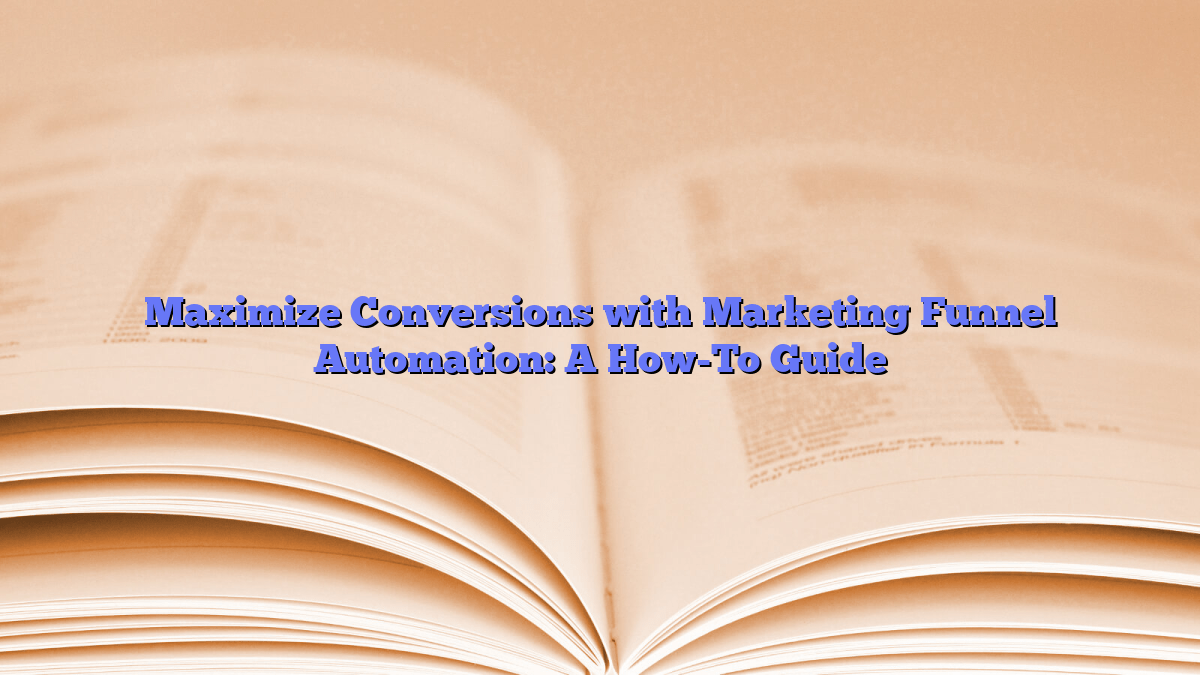Digital Marketing
Maximize Conversions with Marketing Funnel Automation: A How-To Guide
Are you looking to maximize your conversions and increase your sales through marketing funnel automation? Look no further! In this article, we will provide you with a comprehensive how-to guide on marketing funnel automation and how it can help you achieve your business goals. By the end of this guide, you will have the knowledge and tools to effectively implement marketing funnel automation and see results.
Understanding Marketing Funnel Automation
Marketing funnel automation is the process of using technology and automation tools to streamline and optimize the customer journey from the initial awareness stage to the final conversion stage. It involves leveraging various marketing channels such as email, social media, and paid advertising to guide potential customers through the different stages of the marketing funnel and ultimately convert them into paying customers.
How to Maximize Conversions with Marketing Funnel Automation
Now that we understand what marketing funnel automation is, let’s dive into the steps to maximize conversions using this strategy:
1. Define Your Customer Journey
The first step in maximizing conversions with marketing funnel automation is to clearly define your customer journey. This involves understanding the different stages that a potential customer goes through, from awareness to consideration to decision. By mapping out the customer journey, you can identify the touchpoints where automation can be implemented to guide customers through the funnel.
2. Implement Lead Capture and Segmentation
Once you have defined the customer journey, the next step is to implement lead capture and segmentation. This involves capturing leads through various channels and segmenting them based on their behavior, interests, and demographics. By segmenting your leads, you can create personalized and targeted marketing campaigns that are more likely to resonate with your audience.
3. Create Personalized and Automated Email Campaigns
Email marketing is a powerful tool for engaging with potential customers and guiding them through the marketing funnel. By creating personalized and automated email campaigns, you can deliver the right message to the right people at the right time. This can significantly increase your conversion rates and drive more sales.
4. Utilize Retargeting and Remarketing
Retargeting and remarketing are essential strategies for maximizing conversions with marketing funnel automation. By leveraging these tactics, you can stay top of mind with potential customers who have shown interest in your products or services. This helps to re-engage them and guide them towards completing a purchase.
5. Measure and Optimize Your Funnels
Lastly, it’s important to measure the performance of your marketing funnels and continuously optimize them for better results. By analyzing key metrics such as conversion rates, click-through rates, and engagement, you can identify areas for improvement and make data-driven decisions to maximize conversions.
Conclusion
Marketing funnel automation is a powerful strategy for maximizing conversions and increasing sales. By understanding the customer journey, implementing lead capture and segmentation, creating personalized email campaigns, utilizing retargeting and remarketing, and measuring and optimizing your funnels, you can effectively guide potential customers through the marketing funnel and drive more conversions. With the right tools and techniques, you can achieve significant results and grow your business.
FAQs
1. What are the benefits of marketing funnel automation?
Marketing funnel automation offers several benefits, including increased efficiency, personalized communication, better lead nurturing, and improved conversion rates. It also allows businesses to scale their marketing efforts and reach a larger audience.
2. What tools can I use for marketing funnel automation?
There are several marketing automation tools available, including HubSpot, Marketo, Pardot, and ActiveCampaign. These tools offer features such as email marketing, lead capture and segmentation, marketing analytics, and more to help you streamline and optimize your marketing funnel.
3. How can I measure the success of my marketing funnels?
You can measure the success of your marketing funnels by tracking key metrics such as conversion rates, click-through rates, engagement, and return on investment. By analyzing these metrics, you can gain insights into the performance of your funnels and make informed decisions to optimize them for better results.
4. Can marketing funnel automation work for any type of business?
Yes, marketing funnel automation can be applied to various types of businesses, including B2B and B2C companies. By understanding your target audience and their customer journey, you can create tailored marketing funnels that effectively guide potential customers towards conversion.
[ad_2]
